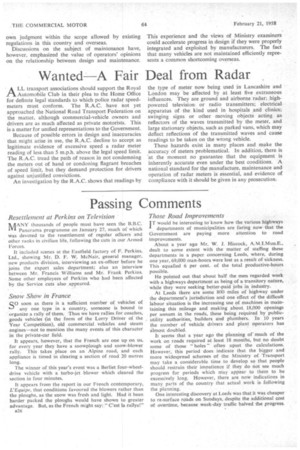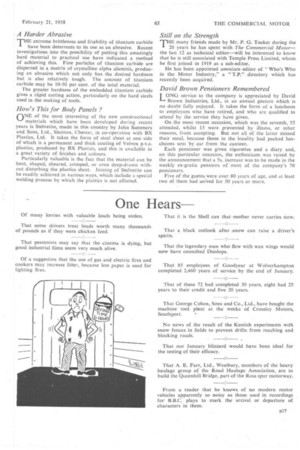Passing Comments
Page 32

Page 33

If you've noticed an error in this article please click here to report it so we can fix it.
Resettlement at Perkins on Television
MANY thousands of people must have seen the B.B.C. Panorama programme on January 27, much of which was devoted to the resettlement of regular officers and other ranks in civilian life, following the cuts in our Armed Forces.
It included scenes at the Eastfield factory of F. Perkins, Ltd., showing Mr. D. F. W. McNair, general manager, new products division, interviewing an ex-officer before he joins the export sales department; also an interview between Mr. Francis Williams and Mr. Frank Perkins. Some other employees of Perkins who had been affected by the Service cuts also appeared.
Snow Show in France
go soon as there is a sufficient number of vehicles of
any one type in a country, someone is bound to organize a rally of them. Thus we have rallies for coaches, goods vehicles (in the form of the Lorry Driver of the Year Competition), old commercial vehicles and steam engines—not to mention the many events of this character in the private-car field.
It appears, however, that the French are one up on us, for every year they have a snowplough and snow-blower rally. This takes place on an Alpine road, and each appliance is timed in clearing a section of road 20 melres long.
The winner of this year's event was a Berliet four-wheeldrive vehicle with a turbo-jet blower which cleared the section in four minutes.
It appears from the report in our French contemporary, L'Equipe, that conditions favoured the blowers rather than the ploughs, as the snow was fresh and light. Had it been harder packed the ploughs would have shown to greater advantage. But, as the French might say: " C'est Ia rallye!" a26
Those Road Improvements
IT would be interesting tdknow how the various highways departments of municipalities are faring now that the Government are paying more attention to road improvements.
About a year ago Mr. W. 5. Hiscock, A.M.I.Mun.E., dealt to some extent with the matter of staffing these departments in a paper concerning Leeds, where, during one year, 69,000 man-hours were lost as a result of sickness. This equalled 6 per cent, of the total productive-hours possible.
He pointed out that about half the men regarded work with a highways department as being of a transitory nature, while they were seeking better-paid jobs in industry.
At Leeds there are some 800 miles of highway under the department's jurisdiction and one effect of the difficult labour situation is the increasing use of machines in maintaining this mileage and making about 18,000 openings per annum in the roads, these being required by publicutility authorities, builders and plumbers. In 10 years the number of vehicle drivers and plant operators has almost doubled.
It seems that a year ago the planning of much of the work on roads required at least 18 months, but no doubt some of those " holes " often upset the calculations. However, this period does indicate that the bigger and more widespread schemes of the Ministry of Transport may take a considerable time to develop so that people should restrain their impatience if they do not see much progress for periods which May appear to them to he excessively long. However, there are now indications in many parts of the country that actual work is following the planning. One interesting discovery at Leeds was that it was cheaper to re-surface roads on Sundays, despite the additional cost of overtime, because week-day traffic halved the progress.
• A Harder Abrasive
THE extreme brittleness and friability of titanium carbide
have been deterrents to its use as an abrasive. Recent investigations into the possibility of putting this amazingly hard material to practical use have indicated a method of achieving this. Fine particles of titanium carbide are dispersed in a matrix of crystalline alpha alumitfa, producing an abrasive which not only has the desired hardness but is also relatively tough. The amount of titanium carbide may be 10-50 per cent, of the total material.
The greater hardness of the embedded titanium carbide gives a lipid cutting action, particularly on the hard steels used in the making of tools.
How's This for Body Panels ?
nNE of the most interesting of the new constructional
materials which have been developed during recent years is Stelvetite, made in this country by John Summers arid Sons, Ltd., Shotton, Chester, in co-operation with BX Plastics, Ltd. It takes the form of steel sheet at one side of which is a permanent and thick coating of Velvex p.v.c. plastics, produced by BX Plastics, and this is available in a great variety of finishes and colours.
Particularly valuable is the fact that the material can be bent, shaped, sheared, crimped, or even deep-drawn without disturbing the plastics sheet. Joining of Stelvetite can be readily achieved in various ways, which include a special welding process by which the plastics is not affected.
Still on the Strength
THE many friends made by Mr. P. G. Tucker during the I 20 years he has spent with The Commercial Motor— the last 12 as technical editor—will be interested to know that he is still associated with Temple Press Limited, whom he first joined in 1919 as a sub-editor.
He has been appointed associate editor of "Who's Who in the Motor Industry," a " T.P." directory which has recently been acquired.
David Brown Pensioners Remembered
LONG service to the company is appreciated by David Brown Industries, Ltd., in an annual gesture which is no doubt fully enjoyed. It takes the form of a luncheon to employees who have retired, and who are qualified to attend by the service they have given.
On the most recent occasion, which was the seventh, 55 attended, whilst 15 were prevented by illness, or other reasons, from accepting. But not all of the latter missed their meal, because those in the locality had packed luncheons sent by car from the canteen.
Each pensioner was given cigarettes and a diary and, on this particular occasion, the enthusiasm was raised by the announcement that a 5s. increase was to be made in the weekly ex-gratia pensions of most of the company's 70 pensioners.
Five of the guests were over 80 years of age, and at least two of them had seeved for 50 years or more.












































































































